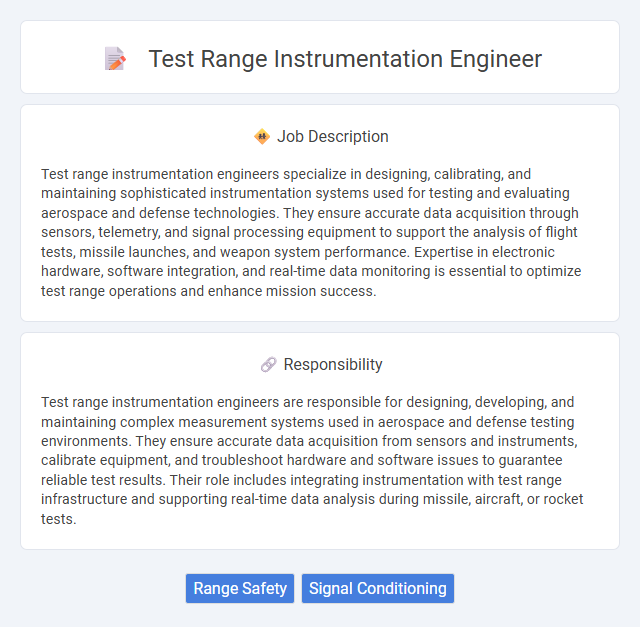
Test range instrumentation engineers specialize in designing, calibrating, and maintaining sophisticated instrumentation systems used for testing and evaluating aerospace and defense technologies. They ensure accurate data acquisition through sensors, telemetry, and signal processing equipment to support the analysis of flight tests, missile launches, and weapon system performance. Expertise in electronic hardware, software integration, and real-time data monitoring is essential to optimize test range operations and enhance mission success.
Individuals with strong analytical skills and a detail-oriented mindset are likely well-suited for a Test Range Instrumentation Engineer role. Those comfortable working in dynamic, high-pressure environments and adapting to complex technical challenges may find the job fits their abilities and interests. However, people who prefer routine tasks or minimal problem-solving might face difficulties thriving in this position.
Qualification
Test range instrumentation engineers require a strong foundation in electrical or systems engineering, typically demonstrated by a bachelor's degree in these fields. Proficiency in designing, integrating, and maintaining measurement and data acquisition systems for test ranges is essential. Practical experience with calibration techniques, signal processing, and relevant industry standards significantly enhances job performance and qualifications.
Responsibility
Test range instrumentation engineers are responsible for designing, developing, and maintaining complex measurement systems used in aerospace and defense testing environments. They ensure accurate data acquisition from sensors and instruments, calibrate equipment, and troubleshoot hardware and software issues to guarantee reliable test results. Their role includes integrating instrumentation with test range infrastructure and supporting real-time data analysis during missile, aircraft, or rocket tests.
Benefit
A Test Range Instrumentation Engineer likely receives benefits such as competitive salaries and comprehensive health coverage, enhancing job satisfaction and security. Access to cutting-edge technology and opportunities to work on advanced defense or aerospace projects probably contribute to professional growth and skill development. Flexible work arrangements and retirement plans may also be offered, supporting long-term career stability and work-life balance.
Challenge
Test range instrumentation engineer roles likely involve complex challenges related to designing, deploying, and maintaining precise measurement systems in dynamic environments. The probability of encountering technical difficulties with sensor calibration, data accuracy, and real-time monitoring remains high, requiring strong problem-solving skills and adaptability. Managing integration of advanced technologies under strict safety regulations may also present considerable obstacles.
Career Advancement
Test range instrumentation engineers develop and maintain advanced measurement systems for aerospace and defense testing, ensuring precise data acquisition and analysis. Mastery of telemetry, sensor integration, and system diagnostics enhances expertise essential for progression to senior engineering roles or management positions. Career advancement opportunities also include specialization in emerging technologies such as real-time data processing and autonomous test environments.
Key Terms
Range Safety
Test range instrumentation engineers specializing in Range Safety design and maintain advanced sensor systems to monitor and ensure secure operating conditions during missile and rocket tests. They integrate real-time data acquisition tools and telemetry systems to detect anomalies and activate safety protocols, minimizing risks to personnel and surrounding environments. Expertise in radar technology, communications, and software diagnostics is critical for maintaining strict compliance with regulatory safety standards.
Signal Conditioning
Test range instrumentation engineers specializing in signal conditioning design and optimize electronic circuits that enhance the quality and reliability of sensor data during testing phases. They ensure accurate signal amplification, filtering, and noise reduction to facilitate precise measurements for missile, aerospace, and defense test ranges. Expertise in analog and digital signal processing, along with experience in hardware calibration and data acquisition systems, is essential for this role.
 kuljobs.com
kuljobs.com